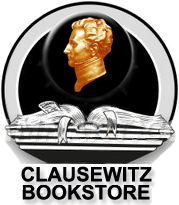 Indexing ON WAR
Indexing ON WAR
Carl von Clausewitz's most famous book, On War, is notoriously difficult to index. The difficulty lies in clearly and consistently identifying, locating, and naming its many interesting concepts. Of these, there are a great many. To deepen the difficulty, Clausewitz purposefully used different wording in the book's various sections to discuss the same basic ideas, in order to force the reader to think rather than merely to absorb a particular jargon or vocabulary. Accordingly, the available indexes vary widely in method, style, coverage, quality, and usefulness. Here are some links and information on a number of them.
*1. Jon Sumida published “A Concordance of Selected Subjects in Carl von Clausewitz’s On War” in The Journal of Military History, 78:1 (January 2014): 271-331. The unabridged text of Sumida's Concordance is now available here on The Clausewitz Homepage (with the permission of JMH). JMH reports that "this concordance of the standard English translation of Carl von Clausewitz’s On War by Michael Howard and Peter Paret breaks new ground in two important respects. First, it indexes the text in unprecedented detail by listing references to every significant proposition and distinctive phrase under major subject headings. Second, information about the location of indexed items includes the book and chapter of On War, and page numbers in both current editions [i.e., the Princeton University Press and the Everyman's Library versions, which are paginated differently] of the standard [i.e., Howard/Paret] translation."
2. Clausewitz.com Word Index to ON WAR (c.113Kb) The Clausewitz Homepage provides a computer-generated index of over 1200 words and phrases, created expressly for this website. It applies only to the H/P translation (and only the Princeton University Press version thereof).
3. SAMS Conceptual Index to ON WAR (c.46Kb). This is a conceptual index which tries to guide the reader to related ideas. It originated at the U.S. Army's School of Advanced Military Studies (SAMS) at Fort Leavenworth in 1994-95.
4. The conceptual index from J.J. Graham's original 1873 English translation of On War. This is superior in many ways to all later indexes—especially the Howard/Paret indexes, which have no conceptual element.
5. The Index from Karl von Clausewitz, On War, trans. O.J. Matthijs Jolles (New York: Random House, 1943; Washington, D.C.: Infantry Journal Press, 1950). The Jolles translation is more accurate than H/P and its index also has many conceptual elements.
6. Casyndekan, Inc. The Clausewitz Casyndekan (Colorado Springs: Casyndekan, Inc., 1969). The massive Casyndekan index, created on a mainframe computer in the 1960s, is about as long as the book itself and thus may not be very helpful. It is, however, an interesting artifact—and further evidence of the effort have long put into trying to make Clausewitz more accessible.
 Visit the
Visit the
Clausewitz Bookstore!
US • UK • France • Germany
| Return to top |
|---|
